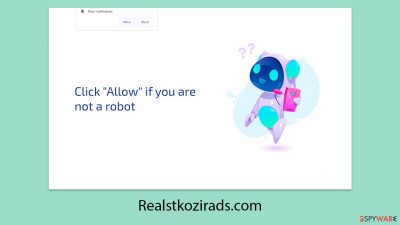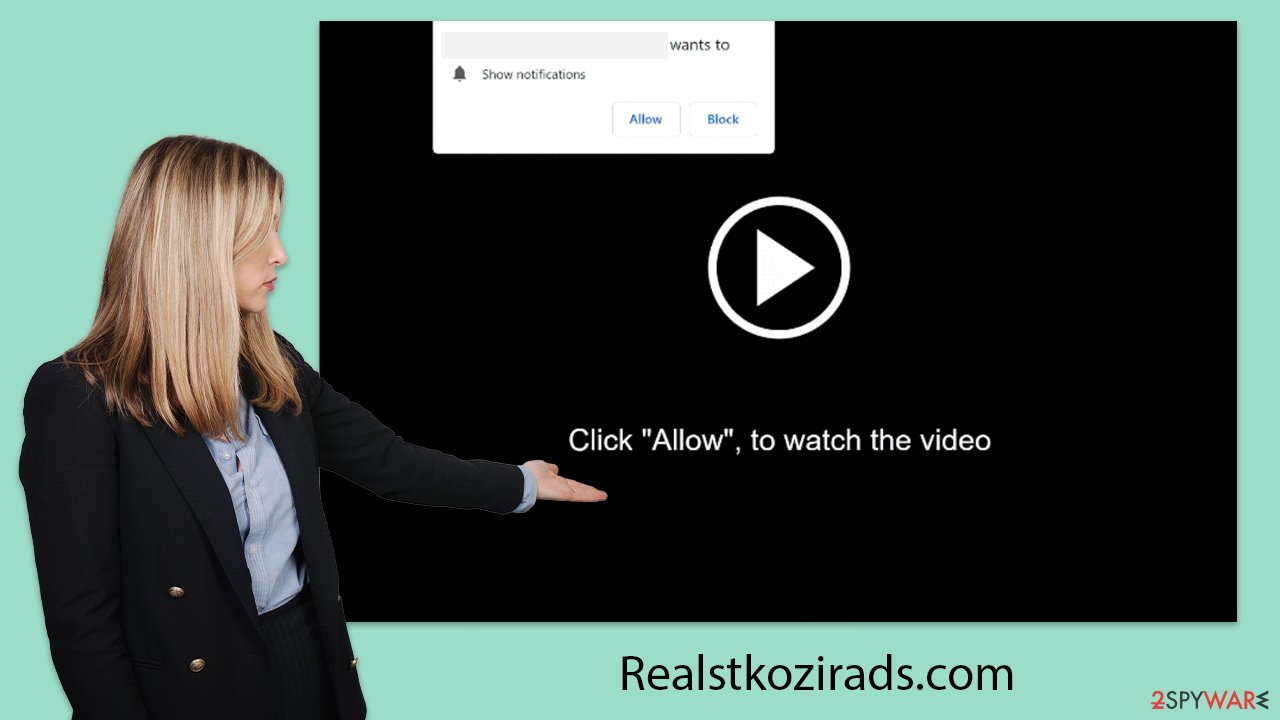Realstkozirads.com ads (scam) - Free Instructions
Realstkozirads.com ads Removal Guide
What is Realstkozirads.com ads?
Realstkozirads.com is a misleading website that can insert malicious ads into your device

Realstkozirads.com is an untrustworthy site with no genuine purpose, primarily managed by fraudsters. Its primary objective is to coerce users into enabling push notifications. This permission grants the site access to the browser API, allowing it to bombard users with a range of insecure content. This includes false virus warnings, deceptive giveaways, dubious get-rich-quick schemes, and other phishing attempts.
The presence of redirects to Realstkozirads.com or a surge in advertisements during your regular web browsing might indicate an adware infection, though not directly caused by the website itself. In response, this article will offer detailed guidance on how to disable these intrusive push notifications and thoroughly eliminate any adware, including all associated remnants, from your computer system.
| Name | Realstkozirads.com |
| Type | Push notifications, ads, pop-ups, scam |
| Distribution | After the “Allow” button is pressed within the notification prompt |
| Symptoms | Push notifications from the site show up on the desktop. These pop-ups show fake notices and push scams. Links can also lead to websites filled with malware |
| Risks | Installation of potentially unwanted programs or malware, data loss, information leak, financial losses due to encountered scams |
| Termination | To prevent you from receiving alerts, go to your browser settings and adjust the permissions for the website – more on that below. We also recommend scanning your PC with SpyHunter 5Combo Cleaner security software to ensure it is free of adware |
| Recovery | To make sure that third parties can no longer track your online activities, we suggest clearing browser caches and other leftover PUP files with FortectIntego |
How scammers reach their goals
Often, unsuspecting users land on harmful sites like Realstkozirads.com by simply following a link from another site. This approach catches users off guard and employs seemingly familiar messages, such as:
Click “Allow” to confirm that you are not a robot
This technique is a common phishing strategy used by sites that exploit push notification scams. It’s effective because it mimics verification methods familiar to users from other legitimate websites, suggesting a routine check. Many sites use captcha or similar technologies to safeguard against DDoS attacks, making this guise more believable.
In some instances, visitors may be prompted to confirm if they are over 18 years old – another familiar verification method that can suggest the presence of adult content. However, contrary to what the message implies, Realstkozirads.com does not offer any substantive content.
Regardless of the type of deceptive push notification prompt you encounter, clicking the “Allow” button can grant the website permission to send notifications at any time, including a variety of content, primarily advertisements. This method is a highly profitable tactic for operators of scam sites, which is why the proliferation of such schemes continues.

How to avoid malicious websites online?
It's essential to understand how deceptive and damaging content propagates online, as this knowledge can prevent many people from accessing these sites in the first place. While the internet has robust security measures through reputable websites, browsers, search engines, and other digital infrastructure, these safeguards are designed to hinder the spread of phishing and other harmful material.
For example, platforms like Google deploy sophisticated scanning technologies to detect and remove unsafe websites from search results, significantly reducing the likelihood of users encountering malware, phishing schemes, or other undesirable content. Despite these efforts, the system isn't foolproof; occasionally, scammers find ways to bypass these protections, and even secure sites can be compromised, exposing visitors to malicious content.
The highest risk of encountering suspicious activity, however, is on websites inherently lacking robust security measures—such as peer-to-peer sharing platforms, gambling sites, and adult content sites. These types of websites often do not offer sufficient protection, making users vulnerable to malicious ads, dangerous links, or harmful downloadable files.
Engaging with these websites increases the risk of being redirected to sites like Realstkozirads.com or accidentally downloading malware. It's advisable to steer clear of these risky online environments to safeguard your digital safety.
Remove Realstkozirads.com ads and potential threats
If you were tricked into enabling push notifications by Realstkozirads.com, don’t worry; disabling them is straightforward. It’s important not to interact with these ads or links, as doing so can lead to malware infections and other security risks. We strongly recommend conducting a thorough system scan using SpyHunter 5Combo Cleaner or Malwarebytes security software to ensure your computer is free from adware or other types of malware, regardless of whether you've clicked on any suspicious links or downloaded files.
Security software not only helps to check for and remove adware but also serves as a crucial shield against possible ransomware attacks and similar threats. After ensuring your device is malware-free, it's a good idea to use a trusted utility like FortectIntego to clear your browser's cache and other residual files, which can also help repair any damage to system components. This utility can also remove cookies and other tracking data collected by third parties.
To stop receiving intrusive ads from Realstkozirads.com, you'll need to modify your browser settings to block the website's URL from sending these notifications. If you require guidance on how to do this, here are some steps to follow:
Google Chrome (desktop)
- Open the Google Chrome browser and go to Menu > Settings.
- Scroll down and click on Advanced.
- Locate the Privacy and security section and pick Site Settings > Notifications.
- Look at the Allow section and look for a suspicious URL.
- Click the three vertical dots next to it and pick Block. This should remove unwanted notifications from Google Chrome.
![Stop notifications on Chrome PC 2 Stop notifications on Chrome PC 2]()
Google Chrome (Android)
- Open Google Chrome and tap on Settings (three vertical dots).
- Select Notifications.
- Scroll down to the Sites section.
- Locate the unwanted URL and toggle the button to the left (Off setting).
![Stop notifications on Chrome Android Stop notifications on Chrome Android]()
Mozilla Firefox
- Open Mozilla Firefox and go to Menu > Options.
- Click on Privacy & Security section.
- Under Permissions, you should be able to see Notifications. Click the Settings button next to it.
- In the Settings – Notification Permissions window, click on the drop-down menu by the URL in question.
- Select Block and then click on Save Changes. This should remove unwanted notifications from Mozilla Firefox.
![Stop notifications on Mozilla Firefox 2 Stop notifications on Mozilla Firefox 2]()
MS Edge (Chromium)
- Open Microsoft Edge, and go to Settings.
- Select Site permissions.
- Go to Notifications on the right.
- Under Allow, you will find the unwanted entry.
- Click on More actions and select Block.
![Stop notifications on Edge Chromium Stop notifications on Edge Chromium]()
Safari
- Click on Safari > Preferences…
- Go to the Websites tab and, under General, select Notifications.
- Select the web address in question, click the drop-down menu and select Deny.
![Stop notifications on Safari Stop notifications on Safari]()
Internet Explorer
- Open Internet Explorer, and click on the Gear icon at the top-right of the window.
- Select Internet options and go to the Privacy tab.
- In the Pop-up Blocker section, click on Settings.
![Stop notifications on Internet Explorer Stop notifications on Internet Explorer]()
- Locate the web address in question under Allowed sites and pick Remove.
How to prevent from getting adware
Stream videos without limitations, no matter where you are
There are multiple parties that could find out almost anything about you by checking your online activity. While this is highly unlikely, advertisers and tech companies are constantly tracking you online. The first step to privacy should be a secure browser that focuses on tracker reduction to a minimum.
Even if you employ a secure browser, you will not be able to access websites that are restricted due to local government laws or other reasons. In other words, you may not be able to stream Disney+ or US-based Netflix in some countries. To bypass these restrictions, you can employ a powerful Private Internet Access VPN, which provides dedicated servers for torrenting and streaming, not slowing you down in the process.
Data backups are important – recover your lost files
Ransomware is one of the biggest threats to personal data. Once it is executed on a machine, it launches a sophisticated encryption algorithm that locks all your files, although it does not destroy them. The most common misconception is that anti-malware software can return files to their previous states. This is not true, however, and data remains locked after the malicious payload is deleted.
While regular data backups are the only secure method to recover your files after a ransomware attack, tools such as Data Recovery Pro can also be effective and restore at least some of your lost data.






